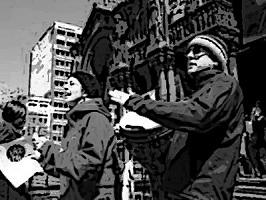Mary and Martha: Contemplation in Action: Lenten Meditation, 2/26/2013
Luke 10:38-42
By: Cameron Partridge

At first glance, the story about Mary and Martha (Luke 10:38-42), unique to the Gospel of Luke, can be confusing, even irritating. Martha and Mary are hosting Jesus, and while Martha attends to the details of hospitality, Mary simply sits at Jesus’ feet, listening. Eventually Martha complains, can’t Jesus encourage Mary to join her? But no: “Mary has chosen the better part, which will not be taken away from her.” It’s a strange, potentially irritating reply. After all, Martha is perfectly within her rights to challenge her sister’s seeming complacency, and Jesus’ reply is mysterious at best. Is Martha’s more practical work meaningless while Mary’s contemplation is ultimately what counts? That conclusion could – and does – cause a conflagration in many a household.
But just reading the passage in context makes it clear that critiquing Martha’s praxis orientation or ranking Mary’s listening more highly cannot be Luke’s point. After all, the parable that just precedes this one – the Good Samaritan (Luke 10:25-37) – ends with the enjoinment “go and do likewise.” As in, do justice to your neighbor, particularly the most marginalized.
In two homilies on our text (103 and 104), the Augustine of Hippo (354-430 CE) read Martha’s activity through just that kind of lens. She was operating in the spirit of the ministry starkly detailed in Matthew 25, doing unto Jesus, her guest, what all should do unto the least of these. Meanwhile by sitting at Jesus’ feet, Mary was modeling the contemplative life on earth as it is in heaven. Although theologians over the centuries have typically valued Mary’s practice over Martha’s, they have also been clear that each approach is intimately connected with the other, and that Christian life ultimately requires both.
Last fall an intergenerational, strongly young-adult group from the Episcopal Diocese of Massachusetts participated in a street liturgy for economic justice. Organized by Episcopalians for Global Reconciliation, the heart of the event used the lens of our interconnection to call us to think, pray, and act differently about how we use, and where we invest, our money. We walked the threshold of the world and the church, intentionally making that borderland visible in the streets of Boston by processing and singing hymns behind a vested crucifer and thurifer. We broke bread and drank wine beside a subway stop. The following weekend we brought our message, our questions, to the diocesan convention, where our resolution passed after one of the more spirited diocesan convention debates I’ve seen in years. I was proud to watch young adults who had previously scoffed at my energy for this aspect of our polity stand up and be counted. Some are now involved in planning a conference at Harvard Divinity School on April 20 – “Contemplation in Action.”
Now, not everyone at the convention was happy about our message. Talking about money, and about economic class more broadly, is uncomfortable, sometimes excruciating. But our strong sense of interconnection and collective accountability urged us on. And that awareness ultimately stemmed from our prayer, our common worship, our understanding of our care for and connection with one another. It was and is an outgrowth of our understanding of the gravity of the gospel and the boundless love of God.
Reflecting symbolically on Mary and Martha, the anonymous fourteenth-century author of The Cloud of Unknowing explains that the practice we sometimes call “charity” is “nothing else than loving God for [Godself], above all created things, and loving people in God just as we love ourselves.” We are embodying the true spirit of “charity” when we are filled with love, when our actions emerge from its wellspring: love of God, love of our neighbors as ourselves. The love that infuses our prayer causes us to love the world, stranger and relative, foe and friend. “Yes, and sometimes more to foes than to friends!” (Chapters 24-25).
At the end of the day, our most authentic prayer and action stem from the same source: unbounded love of the God who made us, reconciled us and calls us to be agents of that reconciliation in ourselves and in the world. Mary and Martha may not quite be two sides of the same coin, but they are as inextricably bound as they are distinct. We need them both.
Gracious and loving God, whose Son Jesus Christ enjoyed the friendship and hospitality of Mary, Martha, and Lazarus of Bethany: Open our hearts to love you, our ears to hear you, and our hands to welcome and serve you in others, through Jesus Christ our Lord; who with you and the Holy Spirit lives and reigns, one God, for ever and ever. Amen.
